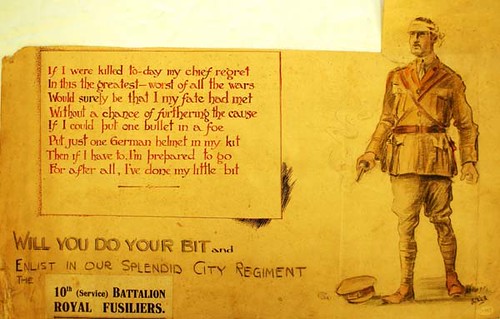
http://www.flickr.com/photos/mfspeccoll/4899716083/in/set-72157624742434942
There are several layers to the interpretation of this poster. First, it invokes nationalism by suggesting that it is a man's "bit" to fight for his country and that losing his life is justified if he does it in war. It also states that this is "the greatest- worst of all wars", reminding the audience that there are thousands of men dying, which is also reflected in the image of the wounded soldier holding a gun. The thought of losing fellow countrymen to the Germans is here used to persuade unenlisted men to help out. In addition, this invokes the image of what a man should be: courageous, unafraid, sacrificial and heroic. A man who views this poster is supposed to feel lesser than because he is not out there fighting while other men are, implying that he is not as strong, manly or brave as the current soldiers.
The propagandistic aspect of this poster is the part that I find most interesting. The Very Short Introduction mentioned the use of propaganda against the Germans to paint them as evil monsters, which is touched upon in the James reading, but it is interesting from an Allied perspective because today we usually associate propaganda with the Axis Powers of WWII, especially glorifying Hitler. The soldier in this poster is dreaming about killing Germans, saying that having "one German helmet in [his] kit" will make his death totally justified. This heroic image of a soldier is coupled with a heartless depiction of the foe even though the soldier on the poster is given no specific marking to signify that he is American, English, or a soldier from an allied country. This is probably done so that it could be circulated in different allied regions, as the James reading said would often happen (ie the poster with the image of the French woman plowing). This gives the poster a sense that it could have been anywhere and is therefore less personalized and more generic so that the propaganda could be heavily circulated and continue to keep the stereotypes about Germans alive.

Comments
Kristyn Baker
Mon, 02/04/2013 - 23:59
Permalink
I agree with the observations
I agree with the observations you have made. Something additional that I found interesting kind of piggy backs on what you said about propaganda portrying the Germans as monsters: The sort of sentiment paints a picture where German lives lost are not worth caring about. It makes me think of the discussion we had in class about there not always being animosity among the troops themselves. This is the eact opposite of what this poster is saying. When the solider is saying that his death will be justified if he can kill a German, it dehumanizes them as if they would not also be leaving behind a mother, father, and possibly wife and kids.
Toby Decker
Tue, 02/05/2013 - 01:15
Permalink
I thought this poster was
I thought this poster was fascinating! It is a very interesting depiction of what a poster shouldn't be (it contains lots of text, which isn't necessarily best for a mass audience--think of preachy memes!). Also, the image, especially when paired with the text, is kind of gruesome. He talks about getting a German helmet, when his own hat is on the ground, signaling that he is close to death himself. And, the text is a poem! One can hardly be surprised that this is a Brittish rather than American piece of propoganda!